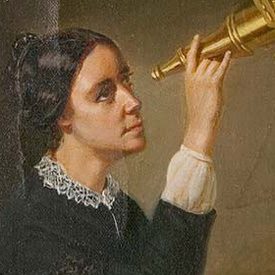Maria Mitchell was born on this day in 1818 in Nantucket, Massachusetts.
The family were Quakers, and contrary to the larger community, they conformed to the Quaker sense that both female and male children should be educated. When she was eleven Maria’s father started a school and in addition to being a pupil there, she began to assist her father. Her passion was astronomy. And by the age of twelve with some assistance from her father she calculated the moment of a solar eclipse.
She continued her education at Cyrus Peirce’s school for young ladies. Peirce was also a Unitarian minister and she eventually embraced Unitarianism. After assisting Peirce for several years, in 1835 she opened her own school. Her color-blind admission policy stirred the local pot. But not enough to prevent the town leaders from offering her the position as Nantucket’s first librarian. She would remain there for twenty years.
What she is most remembered for is her work as an astronomer.
In 1847 she discovered comet 1847 VI, or, as it is more popularly known “Miss Mitchell’s Comet.” Her discovery was a sensation. She was awarded a gold medal by the king of Denmark. It was inscribed “Non Frusta Signorum Obits Speculamur et Ortus,” a line from Virgil meaning “Not in vain do we watch the setting and rising of the stars.”
She was the first woman elected a fellow of the American Academy of Arts and Sciences and of the American Association of the Advancement of Science. She was one of three to be the first women elected to the American Philosophical Society.
In 1865 she was invited to become founding professor of astronomy at Vassar College, where she also worked as Director of the college’s observatory.
In addition to her fame as a scientist, she was active in the struggle for women’s rights. During her tenure at Vassar she discovered despite her prominence and the quality of her work she was earning less than what men were, she objected and won her raise. She was a founder of the American Association for the Advancement of Women.
She died in 1889.
This urge to watch the stars, as old as our humanity, is part of that great curiosity which if there is anything that might save us from the seeds of destruction that also live within our hearts.
Maria is an exemplar of that alternative to following the poisons of grasping and aversion and stultifying certainties, of those urges to learn, and to become…
Thank you, Maria!
And onward to the edge!













